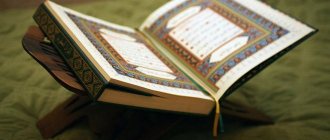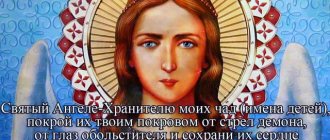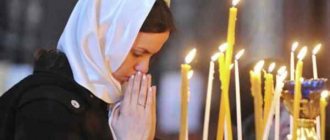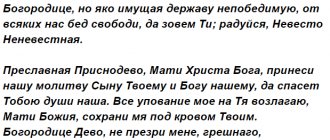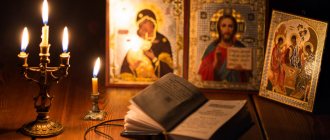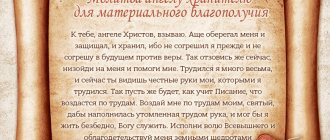Universal Prayer
In our Church there is a tradition of repeating some prayers several times. Probably, most often believers repeat “Lord, have mercy.” There is, for example, such a part of the liturgy as a special litany - that is, special petitions with which we turn to God after reading the Gospel. After each petition, they sing “Lord, have mercy” three times. We also pronounce these words several times during the morning and evening prayer rules, and sometimes the number of repetitions reaches forty - as during the reading of the canon for Holy Communion. Why is that, why her? The fact is that “Lord, have mercy” is a universal prayer that expresses almost all of our petitions. By “have mercy” we mean forgiveness of our sins, a request for help in a spiritual struggle, a request to be merciful to our loved ones, and hope for gaining the Kingdom of Heaven and deliverance from eternal torment.
Why do we repeat the words of this prayer more than the same number of times? — because we pray for different things and for different purposes.
They said it once and prayed. They repeated it three times - they prayed and asked more persistently. We repeat twelve or forty times for greater concentration on this prayer.
“Lord, have mercy” is read forty times in churches at those moments of worship when something important is happening. At this time, we need to maintain a special state of prayer and concentration - so we repeat this simple but deeply meaningful prayer many times.
An interesting point: previously there was no choir in churches. If you look at old liturgical books, it turns out that they mention the priest, deacon, reader - and the lyric, that is, all the people who are in the temple. Since all these Christians could not perfectly know the divine service, and it is very important to pray together, the Church gave them this opportunity - they read the prayer “Lord, have mercy” many times during the service. Now the choir does this for us, and we join in the prayer mentally.
Morning rule for children
Raising their children in the love of God, many Christians come to priests with questions about whether they should be forced to pray, at what age this should be done, and what morning children’s prayers should be learned. There is no need to force a child; it is important to be an example for him in order to encourage him to pray together through his actions. Over time, he will independently follow the morning rule. It is necessary to ask God for help; it is important to learn to thank - Higher powers, parents and loved ones. Short, meaningful prayers are ideal for young children:
- The Publican's Prayer
is one of the most commonly used short prayers. - Pre-initiation prayer
- the text is read before starting any task. - The Prayer to the Holy Spirit
is a doxological prayer that glorifies the Holy Spirit. - The Trisagion
is a prayer that is often read not only as an independent work, but also at the beginning of services. - Guardian Angel
- an appeal to the Angel, who is always next to every believer since baptism.
Why three, twelve and forty, and not twenty-eight, nineteen and some other number?
The numbers three, twelve and forty have a special, symbolic meaning in our Church. Three is the number of the Holy Trinity and a symbol of completeness. Twelve is the number of the tribes of Israel, the number of the apostles. Forty is the number of days of the Great Flood, the same number of years that Moses led the Jewish people through the desert. The Savior fasted in the desert for forty days; He spent the same amount of time on earth after the Resurrection.
Repeated repetition of prayers is necessary so that we understand what we are actually asking for. People who consider themselves spiritually successful sometimes ask for some strange gifts - the gift of tears or insight. Others are so busy worrying about pressing problems that they ask only for solutions to them. Unfortunately, both the first and second forget about the main thing - salvation.
More repetitions of prayers are needed so that we collect scattered thoughts. It is for this reason that the practice of saying the Jesus Prayer has become very deeply integrated into the lives of monks. It is short and does not allow the thoughts of the worshiper to run away. So, if we are not reciting prayers, but actually trying to pray, repeating short prayers helps our mind focus.
Also, by repeating prayers, Orthodox Christians share their joy. An example of this is the repeated repetition of “Christ is risen from the dead” and “having seen the Resurrection of Christ.” We cannot help but rejoice, because Christ is Risen, hell is defeated, there is no death! We may be asked: why not, if people die every day? Yes, this is true, but now we know that death is not the end of life. In this regard, I remember the inscription on the grave of one girl who belonged to the first Christians: “She is alive.”
By the way, if you trace what the burial culture was like in the pre-Christian era and what it became after the coming of Christ into the world, you will notice a colossal difference. In ancient times, the dead were “resettled”, cemeteries were moved outside the boundaries of the settlement, “cities of the dead” and necropolises were created. And what do we see centuries later? Every city has cemeteries. Christians believe that there is no death that separates us from God. Everyone understands: after the end of earthly life, he does not go to Sheol, but goes into the arms of a loving God, Whom he has loved all his life. That’s why we rejoice so much at Easter services. We repeat the good news - and give the opportunity to hear it to those who may not have heard it yet.
The prayer “Hallelujah, hallelujah, hallelujah, glory to you, O God” is also a manifestation of our joy and gratitude. The very word “hallelujah” means “glory to you, O God.” It turns out very interesting here: we pray with a borrowed word, and immediately explain it - we pronounce the translation. Why is that? Because not all Christians knew and know foreign languages, but we need to pray together.
Morning prayer of the Optina elders
Optina Pustyn is a place in the Kaluga region where elders gathered in the 19th century to teach the Russian intelligentsia to believe in God. The word “Optina” comes from the name of a man who first came to this earth and became a hermit, believing in the Lord. Who he is and where he comes from is not known for certain. The desert used to be called a “solitary place” where monks lived. The place where God speaks to us is Optina Pustyn; morning prayers here have a special meaning. Starting the day with the text presented, you can maintain the morning peace until the evening.
Why don’t we read the main prayer, “Our Father,” several times in a row?
We read the “Our Father” prayer many times during the liturgy and throughout the day - not a single service, not a single rule, not a single akathist or canon can do without it. We can read it before meals, before bed, before starting every task - it is universal.
It turns out that many times we repeat short prayers that do not allow the mind to wander, three times - prayers, the meaning of which must be understood. And we repeat the rather long, but very important “Our Father” all the time, so there is no need to pray it three or more times. On the contrary: all the little prayers that precede and repeat it help us to concentrate our attention and read it with maximum concentration.
Everything in the Church is arranged very wisely. It’s worth asking, figuring it out, and your church life will be filled with meaning and joy.
Priest Dimitry Palamarchuk
Morning rule of Seraphim of Sarov
The Monk Seraphim of Sarov devoted his entire life, from childhood to old age, to serving God. He often gave people advice on how to come to faith, how to pray correctly, and so on. Seraphim lived a long righteous life, which is why he is called “venerable” - like God. The church morning rule from Seraphim of Sarov is considered basic for many Orthodox Christians. It says that, upon waking up, every Christian should stand in front of the icons and read the prayers:
- “Our Father”
is a well-known prayer; it must be read three times. - “Virgin, Mother of God, Rejoice”
must be read three times in a row. - The “Creed”
is a prayer very revered by many believers; it must be read once.
Under God's protection
In some regions of Ukraine, the main greeting for several centuries has been the phrase “Glory to Jesus!” By pronouncing it, a person testifies to his respect and faith in the Son of God and wishes the Lord's protection to the one to whom the greeting is addressed.
The protective effect that the Jesus Prayer provides is almost limitless. After all, by pronouncing the name of the Son of God, a person affirms that Jesus is the Lord, and by calling on Him for help, we recognize that God is the center of the Universe, we receive support from Him, that ray of light that every soul needs.
Priests advise, before reading the Jesus Prayer, to repent and begin reading with a pure, free heart, ready to accommodate the Divine power with which it will be filled as it is reunited with the Lord.
And one more thing: the Jesus Prayer is capable of cleansing oneself from sins; one only has to admit oneself as a sinner after “have mercy on me” and add: “judgmental, envious, proud,” etc.
Text and meaning of prayer
The Holy Fathers call it revelation, confession of faith and vow. Despite its brevity, the Orthodox Jesus Prayer is very capacious in content, and allows each person praying to put their own meaning into it.
When saying: “Lord Jesus Christ, Son of God, have mercy on me!”, everyone means the pardon that he needs at the moment. Someone prays for a successful day, someone for health, someone for loved ones, someone for peace, someone for their daily bread. And everyone finds the answer in it - not today, then in a week, in a year, but it will definitely come if a person has put a lot of soul into prayer work.
Purification of the heart and the giver of divine gifts - this is how this miraculous prayer is also characterized.
Morning prayers of the Valaam Monastery
No one knows the exact time of the founding of the Valaam Monastery. It is believed that in 1329, a monastery was founded on the island of Valaam by two reverend fathers, Herman and Sergius. It was repeatedly attacked and robbed, but each time believers restored it. The monastery became most famous in the 19th century; architectural monuments of that time are still preserved. The prayers that are read on Valaam are endowed with special power. When the time comes for the morning rule, Balaam freezes. The priests on this island especially reverence the prayer “Have mercy on us, Lord.”
What is mental prayer?
In Christianity, smart doing is understood as maximum concentration of attention and spiritual strength aimed at contemplating God in one’s own heart.
For any prayer, even said not in book words, but in your own words, smart doing is very important. Priests always remind about the Jesus Prayer when teaching parishioners how to pray mentally: it makes it possible to focus on the utmost strength. When pronounced for a long time, the person praying rises to one spiritual level, and more understanding of God is revealed in his mind and heart.
The mental prayer of Jesus opens up enormous opportunities in the spiritual world, guiding a person along the path that will bring him only good. But anyone who wants to immediately begin saying this prayer should know: prayer is a feat that must be performed with a pure heart and good thoughts. Otherwise, if there is prayer on your lips, but hatred in your soul, there will be no sense from it, there will be another disappointment, of which there are already enough in life.
Therefore, priests recommend that before reading the Jesus Prayer, confess, take communion, repent and, if possible, forgive all offenders.
How many times should you say the Jesus Prayer?
In principle, church canons allow the repetition of the Jesus Prayer to be limited to a certain number. But which one exactly? How to pray the Jesus Prayer correctly and how many times? Everyone determines this for themselves: when pronouncing a prayer word, you need to listen to yourself. When calmness and joy spread in the soul, everything small and unsightly dissolves, it means that turning to the Son of God has had an effect.
For some, to achieve such a state, ten times of prayer is enough, while for others, even a hundred times is not enough.
In order not to be distracted by calculations and at the same time not to lose track of the number, you can use a rosary while saying the Jesus Prayer.


